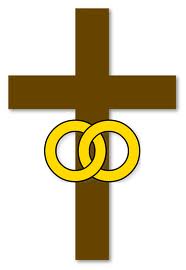 Two things I love about this moment:
Two things I love about this moment:
1: That a presentation at an academic conferences is of interest to anyone other than the 35 people in the room.
2: That people are so bothered that Jesus might have had a wife.
Also, I’m feisty enough to want it to be proven true just to see what would happen.
Karen King, historian of early Christianity at Harvard Divinity School, presented a paper at a meeting of the International Association of Coptic Studies in Rome last week, in which she discussed the fragment:
The papyrus fragment, which measures only about 1 ½ by 3 inches, is written in Coptic that Dr. King says is consistent with writing seen in fourth-century Egypt. It is roughly rectangular, torn on all four sides, so that each line of text is incomplete. The ink on the front side contains eight lines, dark enough to be legible. Line 4 purportedly says, “Jesus said to them, ‘My wife…’ ”
King said that she presented this information at the academic conference so that scholars, experts, historians, and others can debate its authenticity. When asked by Time Magazine “Do you have doubts on the authenticity of the fragment?” She responded: “Oh, yes, absolutely. I think something like this needs to be questioned further.”
And that’s how great scientific and academic work goes. It’s a process of discovery, inquiry, and analysis. Finding questions, looking at and testing possible answers, and refining the questions in search of fuller truth. That the wider public gets an occasional window into the ivory tower and its processes is a good thing. You can even read the 52-page draft of King’s paper on the Harvard website here.
Looking at her paper, you can also get behind some of the hype in media coverage of it. King doesn’t claim that the papyrus fragment proves Jesus had a wife. On the first page, she talks about it as one window into the early Christian community and its debates:
This is the only extant ancient text which explicitly portrays Jesus as referring to a wife. It does not, however, provide evidence that the historical Jesus was married, given the late date of the fragment and the probable date of original composition only in the second half of the second century. Nevertheless, if the second century date of composition is correct, the fragment does provide direct evidence that claims about Jesus’ marital status first arose over a century after the death of Jesus in the context of intra-Christian controversies over sexuality, marriage, and discipleship.
Intra-Christian controversies over sexuality, marriage, and discipleship. Sound familiar? Sound like something we’re still debating? Precisely her point.
Then, we have all of the reaction to the very possibility of a married Jesus. From Rabbi Joseph Edelheit’s “Of course Jesus was married!” to Mark Roberts’ extensive consideration of historical evidence couched in suspicion of those who pursue the married-Jesus hypothesis:
Another reason I have taken time on this issue is that most proponents of the marriage of Jesus thesis have an agenda. They are trying to strip Jesus of his uniqueness, and especially his deity. They want a Jesus who was a mere human being, one with spiritual insight, but otherwise ordinary. The supposed marriage of Jesus is taken by many to be proof that he really wasn’t God in the flesh, but only a mortal man.
It is perceived as a theological threat by people like Roberts (over at the Evangelical Channel here at Patheos), as well as Bill Donohue of The Catholic League dismissing everything about Dr. King’s work, saying among other things that, “King is known for her fertile imagination.”
Here’s why I hope Jesus had a wife: It changes nothing about what is important in his life and work, and it challenges the literalism of conservative Christian traditions and their static view of historical truth. The idea that we already know everything there is to know about peoples’ lives in the first century, and that God couldn’t have worked through an observant married Jewish man is strange to me. Why not?
Patrick Reardon in The Chicago Tribune sums it up this way:
The Sermon on the Mount is the same whether Jesus was a bachelor or a husband. The parable of the good Samaritan, and all of the other parables, are the same regardless of whether Jesus ran them past a wife in a private chat before trotting them out in public.
The cure of the 10 lepers, and all the other cures and all the other miracles, are the same. So is the agony in the garden of Gethsemane. So is the crucifixion on Calvary and, for believers, the resurrection.
The moral teachings and example of Jesus, married or unmarried, would be the same.
That’s what’s exciting about the news.
I agree.
In the meantime, you can follow Mrs. Christ on Twitter. Seriously. It’s awesome.
Stained glass image via.












